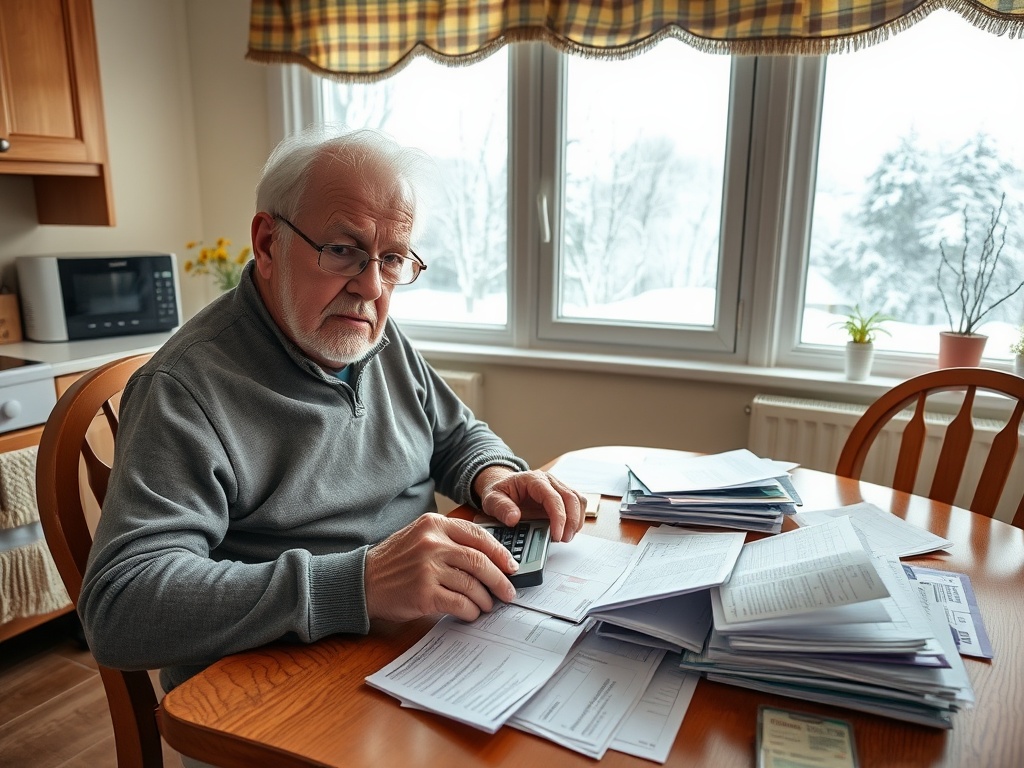Energy Bill Concerns for Pensioner Michael Bailey
Pensioner Michael Bailey, a 71-year-old resident of Essex, is among the many individuals facing significant challenges due to the upcoming rise in energy bills this April. With the new price cap set by Ofgem, typical dual-fuel household energy costs will surge from £1,738 to £1,849, marking a concerning increase of 6.4 percent. Mr. Bailey expressed his anxiety, stating, “I’m really worried. I already struggle to heat my home properly, and now I’ll have to reduce the time I heat my home each day.”
Currently, Mr. Bailey’s monthly energy expenditure is £92, a stark jump from the £62 he was paying just six months ago. He shared his predicament, commenting, “That feels like a lot,” particularly when considering his fixed income situation. Despite being eligible for the winter fuel payment, he is acutely aware of the plight of other seniors who may be even worse off. “I’m worried about other older people, especially those who are just over the limit for getting the winter fuel payment and will miss out this year,” he lamented.
Mr. Bailey qualified for pension credit due to insufficient national insurance stamps, which also entitles him to housing benefit and a reduction in council tax, alleviating some of his financial burdens. However, even with this support, he often finds himself having to keep the heating off and wear extra layers to stay warm, as his flat remains uncomfortably cold.
The Impact of Changes to Winter Fuel Payments

In July, Rachel Reeves announced changes to winter fuel payments, which will now only be available to individuals receiving pension credit or other means-tested benefits. This shift will affect approximately 10.7 million pensioners across the UK, stripping away financial support from 90 percent of the nation’s elderly population. According to Age UK, of these, around 1.6 million live in poverty, 900,000 are just above the poverty line, and 400,000 exist below the threshold necessary for minimum living standards.
Despite his struggles with energy costs, Mr. Bailey has also faced difficulties in securing affordable housing. “I was living with a friend for a while, but then he told me he needed his room back, so I had to try to find a privately rented home,” he recounted. The search proved to be a daunting task, as he described it as a “nightmare.” Fortunately, he eventually found a small one-bedroom rental, crediting pension credit for helping him manage his rent. “I’m very grateful for this as I feel I’d be out on the streets without that help,” he added.
Calls for Government Action
Joanna Elson, chief executive of Independent Age, remarked on the recent price cap announcement, calling it “more bad news for the older people in poverty that have already been subjected to a brutally long and cold winter.” She emphasized that those on fixed incomes are already stretched to their limits, and many report not being able to afford to heat their homes at all. “Now, their bills rise yet again to amounts they simply cannot afford,” she lamented.
Ms. Elson urged the government to devise a strategy to assist older individuals in financial distress, ensuring they have the means to adequately heat their homes. Following the changes to the winter fuel payment, Independent Age’s helpline has experienced a surge in inquiries, with many older adults resorting to extreme measures, such as living in just one room and cutting back on essential food items.
- Government Review: There is an urgent need for the government to review and possibly widen the financial threshold for winter fuel payments.
- Long-term Solutions: Collaboration between the government and Westminster is essential to secure financial stability for the elderly.
- Social Tariff Proposal: Advocates are calling for the establishment of a social tariff for energy, aimed at making bills more manageable for low-income households.
Ofgem has attributed the rise in energy bills to the volatile international gas market, which has driven up wholesale prices. Jonathan Brearley, chief executive of Ofgem, acknowledged the burden of rising costs on households, stating, “We know that no price rise is ever welcome, and that the cost of energy remains a huge challenge for many households.” He emphasized the importance of investing in a cleaner, more sustainable energy system to mitigate these fluctuations in the future.
For those struggling with their energy bills, it is advisable to reach out to their energy supplier to explore potential assistance options. Additionally, switching to a fixed tariff may help reduce costs for many households.




